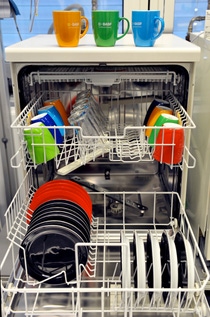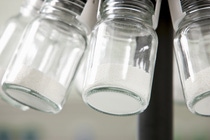Media
No more tea stains and chalky deposits
Innovative BASF components for dishwashing agents keep dishes and glassware sparkling
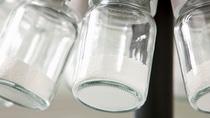
Dishwashing hands were something Josephine Cochrane had only heard about,being a well-to-do American lady with servants to perform such chores. Unfortunately, pieces of her beloved porcelain repeatedly got broken. So Cochrane took the initiative and invented a dishwashing machine in which her valuable porcelain service was secured in wire compartments and rinsed with hot, soapy water. Her device was patented in 1886 and is regarded as the world’s first practical dishwasher. These machines were still cumbersome, however, and did not become widely adopted for home use until the 1960s when the first fully automated versions with a rinse cycle were developed. In today’s industrialized countries, more than 50 percent of all households own a dishwashing machine – and in Germany this figure is even 70 percent. A consumer study in Austria even declared it to be the most popular of all household appliances. Instead of the soapy water used in Cochrane’s time, a wide range of cleaning components are now available to ensure that dishes and glassware remain sparkling clean: surfactants, enzymes, polymers, bleaching agents and chelating agents. BASF supplies almost all of these components for dishwashing tabs to detergent manufacturers worldwide (see Info Box). One of these components is the chelating agent Trilon® M, which is emerging as the preferred alternative to phosphates in high-performance and ecological dishwashing detergents.
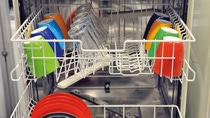
“Conventional multifunctional tabs consist to about one half of phosphates,” says Heike Weber, Head of BASF’s Automatic Dish Wash Laboratory (ADW) in Ludwigshafen. “These prevent unsightly scale by trapping calcium and magnesium ions.” Phosphate, which is also approved as a food supplement, performs this task superbly but has a poor reputation in ecological terms. This is because phosphate is also an important plant nutrient. In the 1960s and 1970s, it was mainly the large amounts of phosphates contained in waste waters from washing machines that led to algae growth; these consumed the oxygen in the water, disrupting the ecological balance of lakes and rivers.
The introduction of stricter phosphate standards for detergents and cleaning agents with changes in the wastewater treatment plants was able to control this phenomenon, known as the eutrophication of waters. Further regulatory steps are in the pipeline. It can be assumed that phosphate will be prohibited as an ingredient of cleaning agents for household dishwashing machines in Europe from 2017 onwards.
Manufacturers are therefore searching unceasingly for alternative chelating agents. These substances have to be as effective and safe as phosphate, but also readily biodegradable. “Following initial pilot trials, a large number of candidates were tested in our ADW laboratory, founded in 2004, until the system ideally satisfying all the requirements was identified,” explains BASF expert Heike Weber. An important constituent is methylglycinediacetic acid (MGDA), brand name Trilon® M. Eco-efficiency analyses have shown that Trilon® M, while preserving the ecological balance of waters, performs its task – trapping troublesome scale – with similar effectiveness as its predecessor.
In 2010 the organic chelating agent from the aminocarboxylate group won the BASF Innovation Award. Each year, BASF confers this internal award to honor outstanding ideas, exemplary entrepreneurship and exceptional achievements of its employees. One example is the success story of Trilon® M. Since its market launch it has gained a firm place among the chelating agents. At the beginning of 2010, BASF brought on stream its expanded worldscale plant for the production of Trilon® M at its Ludwigshafen site. To supply the rapidly growing worldwide demand for this chelating agent, BASF is currently constructing another world scale production facility in Theorore/Alabama. The new production facility is planned to start up in 2015.
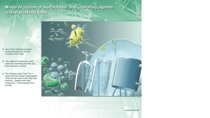
The chemistry of dishwashing
To achieve the perfect dishwashing result, modern dishwashing tabs contain a large number of components with effects that are finely attuned to each other:
Surfactants such as BASF’s Dehypon® and Plurafac®, like conventional soaps, are chemical hybrids: one end of these long molecules preferentially binds to greasy dirt, while the other end attracts water. In this way they make the grease in the water soluble. Because surfactants lower the surface tension of the water, they also enhance the water run-off from the dishes.
Enzymes like amylases and proteases are also natural digestive enzymes. Amylases break up the chain molecule of starch, for example a leftover of flour based meals, into its components and thereby removes it from the dishes. Proteases do the same thing with proteins which are responsible for example for the stickiness of dried egg yolk or meat residues.
Bleaching agents such as hydrogen peroxide remove colored stains of the kind left by tea or coffee.
The builder system of a detergent also contains chelating agents. These bind the water-hardening ions (Ca2+ und Mg2+), which otherwise leave scale on the washed dishes. To do this, they literally take a tight grip on the ion. This is the origin of the Greek technical term chelators (from chele = crab claw).
Although phosphate meets all the requirements placed on a chelating agent, for ecological reasons the phosphate is increasingly being replaced by other substances. Trilon® M as a chelating agent is assuming the role of trapping agent for hardness ions in dishwashing tabs. It is supported in this function by further compounds such as polymers. In the optimal combination, these substances ensure, among other things, that the correct pH is maintained and also disperse salts and dirt. This means: they package insoluble compounds in such a way that they can nevertheless be rinsed away by water.

